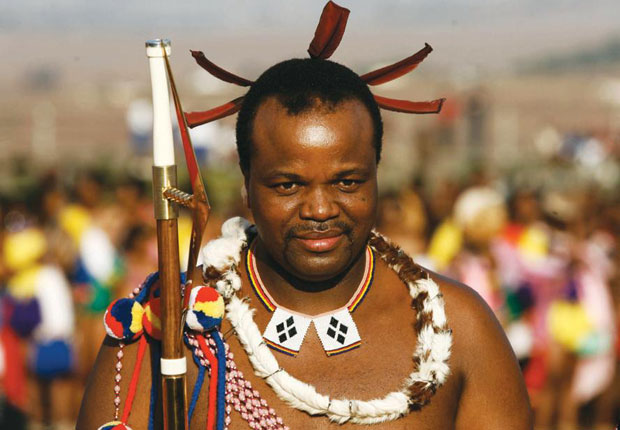Royal greed and oppression sold as culture in Swaziland

Swaziland’s King Mswati III passes suppression, unaccountability and royal opulent spending in the face of drought, starvation and poverty, as traditionally “Swazi” values. Sonkhe Dube, a young exiled activist, begs to differ.
“The Swazi system of governance, ‘Tinkhundla’, is indeed unique”, says, Sonkhe Dube, who is the International Secretary of the Swaziland Youth Congress. “They claim it is a democratic institution that encompasses traditional forms of leadership. But in a democratic state, the cabinet is not handpicked by a king who literally controls everything without being accountable to his citizens”.
King Mswati III has recently spent $ 14 million on a new personal 375-seater jet and will be spending millions of dollars more on hosting a SADC Heads of State summit this year, while a quarter of his population is starving. According to the World Bank, Swaziland is a lower middle income-country.
Swazi law and custom
In Africa, many colonial authorities and traditional leaders together recreated the relatively pluralistic and consensus-driven traditional chiefdoms into a source of royal power that could be controlled by indirect rule.
In Swaziland, King Mswati’s father King Sobhuza II was given the power to appoint and dismiss chiefs and in 1957, 11 years before independence, acts of disobedience against the king were made illegal by a colonial act. The foundations that were laid for such royal hegemony were seen a couple of years after independence, in 1973, when Sobhuza II banned political parties, declared a state of emergency that is yet to be officially repealed and began ruling as an absolute monarch.
Tradition is also the basis for Swaziland’s constitution (from 2005), where the words “...in accordance with Swazi law and custom” are used many times. The constitution also gives the king executive authority in Swaziland and in effect lets him determine what constitutes “Swazi law and custom”.
Cultural oppression
Nevertheless, Swazis are made to believe that the monarchy rules through the people by way of a traditional people’s parliament, ‘Sibaya’, say Sonkhe Dube.
“But when the king called Sibaya in 2012, and the convention pronounced to the king that they wanted the Prime Minister Sibusiso Dlamini and his cabinet out, the king responded by keeping them. The same Prime Minister is still in charge, against the will of the people”.
Ordinary Swazis are also at the mercy of the king through his chiefs in their everyday lives. One example of this was in September 2014 in Nokwane, where the houses of many poor Swazi families were bulldozed to the ground without a warrant and with only 48 hours’ notice, to make way for a Science Park. Many of them had lived there for decades and had nowhere else to go.
“Chiefs allocate land to people and chase them out of their chiefdoms if they feel there is something wrong with them, as happened in Kamkhweli and Macetjeni, where the king sanctioned the eviction of families. The king and the chiefs also order their subjects to do voluntary manual labour in their fields. The product from the manual labour culturally has to cater for the vulnerable and orphaned, but currently it is not doing that, yet people are still required to provide labour for the chiefs and the monarchy. Culturally, the king and chiefs do not own the land but are supposed to be holding it in trust for the people”, Sonkhe Dube says.
Greedy monarchy
No culture remains frozen in time. Culture is, or ought to be, about the adjustment of society to the needs of its citizens, as well as the other way round.
But according to Sonkhe Dube, the current Swazi Tinkhundla system of governance is by no means adjusting itself to the needs and wishes of the people. It is neither democratic nor even truly traditional in a Swazi sense.
“It is a system based on the manipulation of culture to satisfy the insatiable appetite of the greedy monarchy. The monarchy should stop hiding behind culture. Swazi culture in not only about ceremonies but also about social responsibilities which the present powers that be are intentionally ignoring”, says Sonkhe Dube.
Sonkhe Dube is a teacher by profession. He is the International Secretary of the Swaziland Youth Congress (SWAYOCO), and is currently living in exile in neighbouring South Africa due to his pro-democracy activism and affiliation to SWAYOCO. He has been arrested, detained and tortured on several occasions by King Mswati’s police. He cannot go back to Swaziland, he says, because he fears the response of the brutal Swazi police.
* Peter Kenworthy is a journalist with the Danish organization Afrika Kontakt.
* THE VIEWS OF THE ABOVE ARTICLE ARE THOSE OF THE AUTHOR AND DO NOT NECESSARILY REFLECT THE VIEWS OF THE PAMBAZUKA NEWS EDITORIAL TEAM
* BROUGHT TO YOU BY PAMBAZUKA NEWS
* Please do not take Pambazuka for granted! Become a Friend of Pambazuka and make a donation NOW to help keep Pambazuka FREE and INDEPENDENT!
* Please send comments to [email=[email protected]]editor[at]pambazuka[dot]org[/email] or comment online at Pambazuka News.

Monarchical governance and
Ligação permanente
Monarchical governance and democracy are antithetical concepts. King Mswati III and his traditional oligarchy should desist from throwing dust into the eyes of the swazis. Times have changed. People can no longer stand and stare helplessly as their traditional rulers rape young girls and usurp private property in the name of ‘Tinkhundla’! This is utter hogwash! The French people came to this realization in 1789 and committed regicide( by beheading King Louis VI and Marie-Antoinette through the guillotine!